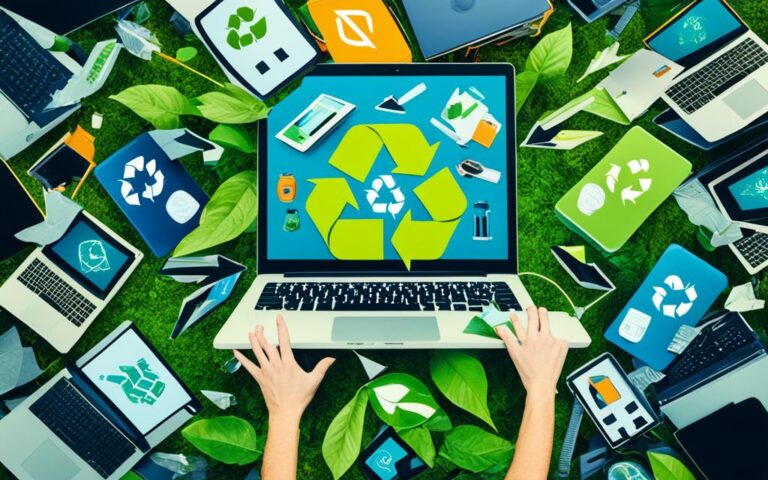How to Ensure Your Recycled Laptop Doesn’t End Up in a Landfill
Landfill avoidance is crucial when it comes to recycling laptops. Improper disposal of electronic waste, or e-waste, can lead to pollution and negative environmental impacts. According to the StEP Initiative, 40 million metric tonnes of e-waste is generated annually, equivalent to the weight of almost 16 billion laptops. Unfortunately, only 5-15% of this e-waste is responsibly recycled. The rest ends up in landfills, stored indefinitely, or illegally shipped overseas. To ensure your recycled laptop doesn’t contribute to landfill waste, it’s important to follow proper recycling practices in the UK.
Properly disposing of your laptop involves a series of steps to ensure both data security and environmental sustainability. By following these steps, you can contribute to a greener future while also protecting your sensitive information. Let’s explore the importance of landfill avoidance, secure disposal, and responsible laptop recycling in more detail.
The Growing Problem of E-Waste
E-waste, also known as electronic waste, has emerged as one of the fastest growing waste streams globally. According to the StEP Initiative, a whopping 40 million metric tonnes of e-waste is produced each year. To put this into perspective, that’s equivalent to the weight of almost 16 billion laptops.
What’s concerning is that only a small percentage, ranging from 5% to 15%, of this e-waste is responsibly recycled. The majority of it either ends up in landfills or is illegally exported. This poses significant environmental and health risks due to the toxic substances present in electronic devices.
The improper disposal of e-waste not only contributes to the growing waste problem but also results in pollution and negative impacts on our environment. Toxic materials like lead, mercury, and cadmium found in electronic devices can leach into the soil and water, endangering ecosystems and human health.
It is crucial to address the challenges posed by e-waste and take necessary steps to combat this issue. By focusing on landfill avoidance and responsible laptop recycling, we can help mitigate the adverse effects of e-waste and create a healthier, more sustainable future.
“The increasing production and improper disposal of electronic waste is a pressing environmental issue that requires immediate attention. The toxic components found in electronic devices pose serious risks to our planet and human well-being. It’s time for us to take action and adopt responsible recycling practices.”
Impact of E-Waste on the Environment and Human Health
The improper disposal of e-waste not only contributes to landfill waste but also has far-reaching consequences for the environment and human health. Here are some key impacts:
- Soil Contamination: Toxic substances present in e-waste can contaminate soil, affecting the growth of plants and compromising agricultural productivity.
- Water Pollution: Improperly disposed of e-waste can contaminate water sources, impacting aquatic ecosystems and posing risks to human health.
- Air Pollution: Recycling processes that are not carried out correctly can release harmful pollutants into the air, contributing to air pollution and respiratory issues.
- Health Risks: Exposure to toxic materials found in e-waste can lead to a range of health problems, including respiratory issues, neurological disorders, and even certain types of cancer.
It is clear that addressing the growing problem of e-waste is essential for preserving the environment and safeguarding our well-being.
The Importance of Responsible E-Waste Recycling
Responsible e-waste recycling is crucial for reducing the environmental and health risks associated with this rapidly growing waste stream. When we recycle electronic devices properly, valuable materials can be recovered, reducing the need for raw material extraction and conserving natural resources.
Additionally, responsible recycling helps ensure that hazardous substances present in e-waste are handled safely and prevented from polluting the environment. This includes the proper treatment and disposal of toxins, as well as the secure destruction of data to protect personal and sensitive information.
By choosing reputable recycling programs and facilities, individuals and businesses can make a positive impact on the environment while promoting a more sustainable future.
A Visual Representation: E-Waste Production Comparison
| Year | E-Waste Production (metric tonnes) | Laptops Equivalent |
|---|---|---|
| 2020 | 40,000,000 | 15,873,016,606 |
| 2019 | 38,000,000 | 15,079,365,079 |
| 2018 | 35,000,000 | 13,888,888,889 |
| 2017 | 32,000,000 | 12,698,412,698 |
The table above highlights the staggering amount of e-waste generated annually and its equivalent weight in laptops. This data reinforces the urgent need for responsible e-waste management and recycling practices.
As the fastest growing waste stream, e-waste demands our immediate attention. By taking proactive steps towards landfill avoidance and responsible laptop recycling, we can mitigate the detrimental impacts on the environment, human health, and future generations.
The Importance of Secure Disposal
Secure disposal of laptops is crucial for several reasons. Firstly, it helps prevent data breaches and exposure of sensitive information. Improper disposal of laptops can result in unauthorized access to personal and financial data, leading to potential identity theft and other cybercrimes. Secondly, secure disposal is essential to reduce the environmental impact of e-waste. Laptops contain hazardous materials such as plastics and metals, which can leach into the environment if not properly disposed of. By ensuring secure disposal, we can protect both our data and the planet.
In today’s digital age, data security is of utmost importance. The consequences of a data breach can be devastating to individuals, businesses, and even nations. When disposing of your old laptop, you need to take necessary precautions to ensure that all sensitive information is permanently erased. Secure disposal methods involve the complete destruction or removal of data from the device, making it inaccessible to unauthorized parties.
The Risks of Improper Disposal
Improper disposal of laptops can have severe consequences. When laptops end up in landfills or in the hands of unauthorized individuals, the risk of data breaches escalates. Cybercriminals can retrieve deleted or formatted data and use it for illegal activities. This could include identity theft, financial fraud, corporate espionage, or unauthorized access to personal and confidential information.
It is estimated that the cost of a data breach in the UK averages around £2.99 million, highlighting the financial impact that organizations can face due to inadequate disposal methods.
Besides the risk of data breaches, improper laptop disposal can also harm the environment. E-waste, including laptops, contributes significantly to the growing global waste crisis. The hazardous materials present in these devices, such as lead, mercury, and cadmium, can contaminate soil, water, and air when not properly managed. This pollution poses threats to both human health and the ecosystem, highlighting the urgent need for secure laptop disposal methods.
The Solution: Secure Laptop Disposal
Secure laptop disposal is the solution to mitigate the risks of data breaches and environmental damage. By choosing a reputable and certified e-waste recycling provider, you can ensure that your old laptop is handled safely and responsibly.
Professional e-waste recyclers follow strict standards and guidelines to securely dispose of laptops. They employ data destruction techniques such as degaussing, shredding, or secure wiping to eliminate any trace of sensitive information. Additionally, certified recyclers have advanced facilities to handle the extraction and recovery of valuable materials from old laptops, reducing the need for raw material mining and promoting a circular economy.
In summary, secure disposal of laptops is crucial to protect data and minimize the environmental impact of e-waste. By entrusting your old laptop to certified recyclers, you can contribute to a safer and greener future while safeguarding sensitive information.
Steps to Properly Dispose of Your Laptop
Properly disposing of your laptop is crucial for both data security and environmental sustainability. Follow these step-by-step guidelines to ensure a secure disposal process:
- Back up your data: Before disposing of your laptop, make sure to back up all important files and documents. This will ensure that you don’t lose any valuable information.
- Wipe the hard drive: To protect your personal data, it’s essential to wipe your laptop’s hard drive completely. Use a reputable data destruction software or seek professional assistance to ensure that all sensitive information is permanently removed.
- Consider recycling: Recycling your laptop is an environmentally responsible option. Look for authorized recycling centers or programs in your area that specialize in e-waste disposal. These facilities have the expertise to safely handle and recycle laptops and other electronic devices.
- Donate or sell: If your laptop is still in good working condition, consider donating it to a charity or selling it to someone who can make use of it. Many organizations accept used laptops and refurbish them for those in need.
- Dispose of peripherals separately: Remember to dispose of your laptop peripherals, such as cables, chargers, and batteries, separately. Some components may require special handling due to their hazardous nature.
By following these steps, you can ensure the secure disposal of your laptop while minimizing the impact on the environment. Remember, responsible recycling and data destruction are key to protecting your personal information and contributing to a greener future.
Conclusion
To ensure a greener future, it is essential to prioritize landfill avoidance and responsible laptop recycling. E-waste is a growing problem globally, with millions of metric tonnes being generated each year. By following the steps outlined in this article, you can ensure that your recycled laptop doesn’t end up in a landfill and that your data remains secure. Recycling your laptop properly not only protects the environment but also reduces the risk of data breaches and potential financial liabilities.
Together, we can make a positive impact on the planet and create a more sustainable future. By choosing responsible laptop recycling methods, we contribute to the reduction of e-waste and promote a circular economy. Remember, every small action counts. Let’s work towards a greener future, one laptop at a time.
Join the movement of responsible electronic waste disposal. Together, we can pave the way for a greener future and protect our planet for generations to come. Start today by recycling your laptop responsibly and encouraging others to do the same. Together, we can make a difference and shape a more sustainable world.
Invest in a greener future by adopting landfill avoidance practices and choosing responsible laptop recycling options. By doing so, we can minimize the environmental impact of e-waste and create a more sustainable future for ourselves and future generations. Act now, and be a part of the solution for a cleaner, greener world.
FAQ
How can I ensure that my recycled laptop doesn’t end up in a landfill?
To ensure that your recycled laptop doesn’t contribute to landfill waste, it’s important to follow proper recycling practices in the UK. This involves finding a reputable recycling facility that specializes in electronic waste recycling. Make sure to inquire about their recycling processes and certifications to ensure they meet industry standards. Additionally, you can consider donating or selling your laptop if it is still in working condition, as this can extend its lifespan and reduce the need for disposal.
Why is e-waste considered one of the fastest growing waste streams?
E-waste, which refers to electronic waste, is considered one of the fastest growing waste streams due to the rapid advancement of technology and the increasing demand for electronic devices. As technology evolves, older devices become obsolete and are replaced with newer models, leading to a constant stream of discarded electronics. This, combined with the lack of proper recycling and disposal practices, contributes to the significant growth of e-waste worldwide.
What are the risks of improper laptop disposal?
Improper laptop disposal can pose several risks. Firstly, it can result in data breaches and unauthorized access to personal and financial information. This can lead to identity theft and other cybercrimes. Secondly, improper disposal contributes to the environmental impact of electronic waste. Laptops contain hazardous materials such as plastics, metals, and potentially toxic substances that can leach into the environment if not properly disposed of. This can lead to pollution and negative environmental consequences.
What steps should I follow to properly dispose of my laptop?
Properly disposing of your laptop involves a series of steps to ensure both data security and environmental sustainability. First, make sure to back up and securely delete any personal or sensitive data from your laptop. You can use data wiping software or consult a professional IT service to ensure complete data destruction. Once your data is secure, research recycling facilities in your area that specialize in electronic waste recycling. Ensure that they have proper certifications and recycling processes in place. Remove any batteries from the laptop and follow the recycling facility’s guidelines for drop-off or pick-up.
How can recycling my laptop help create a greener future?
Recycling your laptop responsibly contributes to landfill avoidance and helps reduce the environmental impact of electronic waste. By recycling electronic devices, valuable materials and components can be recovered, reducing the need for extracting and manufacturing new resources. This conserves energy and reduces greenhouse gas emissions associated with resource extraction and production. Additionally, proper recycling ensures that hazardous materials and toxic substances present in laptops are handled and disposed of safely, protecting both the environment and human health.















